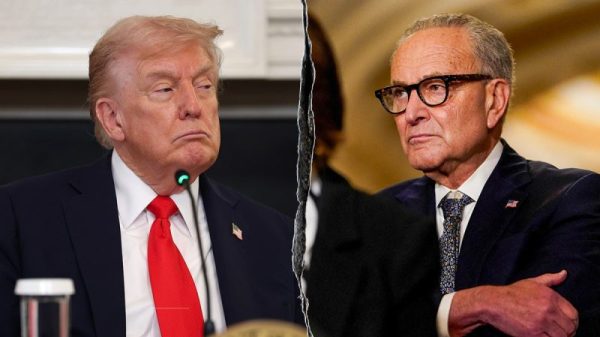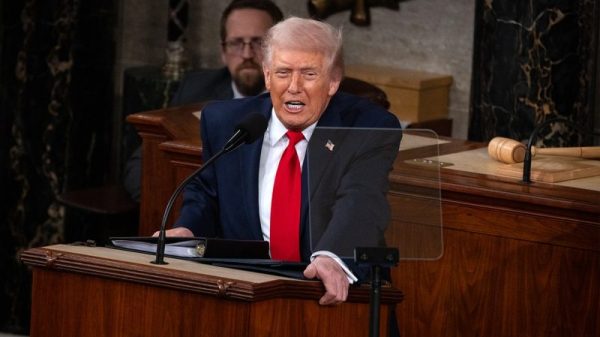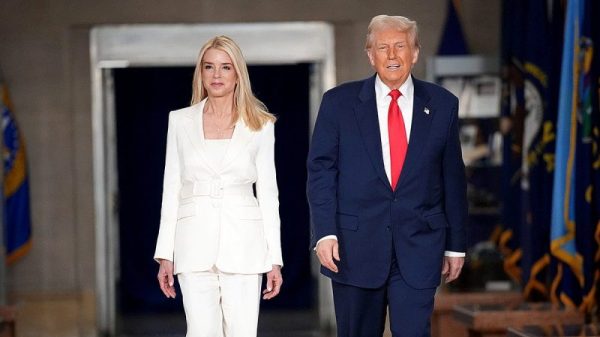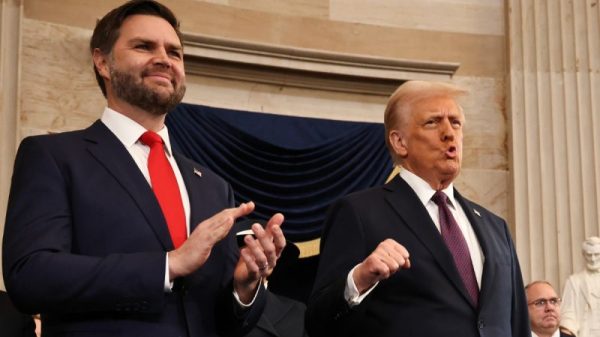President Biden has accused Donald Trump of imitating Adolf Hitler, denounced him as a beacon of “hate, anger and revenge” in a prime-time speech watched by one in 10 Americans and built a campaign that spends nearly three times as much as his rival, including about $84 million more so far in general election advertising.
The result is a jump ball of a presidential race that has changed little this year. Trump maintains a slight edge in public polls, with a much better chance at winning the White House than he had in 2020.
A New York jury’s decision in Trump’s hush-money trial will give Biden yet another opportunity to drive his message, as will a June debate and the summer season of political conventions. But there is little expectation from either campaign that anything — barring an unexpected stumble or disruption — is likely to reset the race before the fall.
Two universally known candidates most Americans hoped would not make the ballot are battling as much for the attention of a dispirited voting public as they are against each other. While Trump’s advisers see room to grow his margins further, Biden is betting his bigger operation is already having an unmeasured impact that will allow him to eke out a narrow victory in the final months.
“The profile of the voter that is going to determine this election is currently not paying attention to this election, and they are not paying attention to the news more broadly,” said Molly Murphy, a pollster for the Biden campaign. “It is not like there is a day on the calendar when all of those voters tune in. It is going to be incremental gains. It is just going to require discipline and persistence.”
That message offers little solace to Democrats who view the coming election as an existential test of the American political system. Americans continue to view Trump’s time in office more favorably than Biden’s, with only 28 percent calling Biden’s presidency “good” or “great” in an April Pew poll, compared with 44 percent who said the same about Trump. Democratic veterans of presidential contests worry that Trump’s populist style could once again drive turnout beyond expectations.
“Trump has run for president twice, and he has overperformed his polls in both those elections,” said Democratic strategist Howard Wolfson, an adviser to the presidential campaigns of Hillary Clinton in 2008 and Mike Bloomberg in 2020.
As the polls now stand, key swing states that Biden won in 2020 — Arizona, Georgia and Nevada — appear to have drifted away since then as parts of his base, including young, Black and Latino voters, continue to show an alarming lack of support for his reelection. There is little numerical evidence to support Biden’s repeated insistence at May fundraisers in Chicago, Seattle and Palo Alto, Calif., that “momentum is clearly in our favor.”
A Washington Post average of high-quality public polls shows Biden is about even in Wisconsin, narrowly trailing in Pennsylvania and Michigan, and behind in the southern and western states by four or more percentage points. Nationally, Biden and Trump are about even in the average, compared to the eight-point advantage he had over Trump at the same point in 2020.
These numbers have boosted the spirits of Trump advisers, who lack the money to respond immediately to the barrage of Biden advertising. A Trump-supporting super PAC, MAGA Inc., has spent about $13 million since March in parts of Georgia, Michigan and Pennsylvania, according to AdImpact.
Biden and his allies have spent about $53 million on ads during that same period across eight states, including the Omaha market, where a single electoral college vote will be decided. They note that former president Obama sometimes trailed his GOP opponent in 2012 before winning reelection.
“Even in 2016, we were never ahead in general election polls. In my last general election poll, we were up four points,” said Jim McLaughlin, a pollster who has worked with Trump in each of his past three campaigns. “If anything, in spite of all these attacks that have been going on for months — the Democrats have spent tens of millions in these battleground states — they have lost ground.”
The Biden campaign maintains that such polling this far out is not indicative of either the November result nor the effect of their spending. Biden’s current efforts, his aides argue, are not aimed at moving polls immediately, but at opening a line of communication with voters who are undecided or persuadable but more disillusioned than previous cycles. As Trump has downsized his own party’s field program, Biden has already opened more than 150 offices and hired more than 500 people, with plans for more than 2,000 by Election Day, campaign officials say.
“We see a large number of voters who are disengaged and need to have longer time spent on them and more respect paid to their opinions,” said Dan Kanninen, the Biden campaign’s battleground states director.
“I would be freaking out if I was a Republican watching Donald Trump simply rely on his name ID and earned media to reach people,” he added, using a campaign term referring to news coverage.
The voters Biden has zeroed in on are generally disapproving of the country’s direction, and have negative views of Biden’s presidency — a fact that Trump advisers believe gives their candidate room to grow. But the same voters are also more Democratic-leaning in down-ballot races, have voted for Democrats in the past and are also turned off by Trump, Biden’s advisers say.
“The impulse is to say, ‘Nothing is moving which means nothing is working,’ ” Murphy said of the public polls. “That is the falsehood there. Nothing moving doesn’t mean that nothing is working.”
The challenge of moving voters is due in part to the overwhelming familiarity with the two principal presidential candidates, who have both already held the job. Field campaigns and political advertising tend to have the greatest impact on races where the candidates are not fully defined in voters minds.
The familiarity with both men helps explain why the current trial in New York — in which Trump faces charges for diverting hush money to an adult-film actress after an alleged affair to help him win election in 2016 — has done so little to move public opinion. Recent polls by Quinnipiac University and NPR/PBS NewsHour/Marist found about two-thirds of voters said a guilty verdict in the trial would have no impact of their likelihood of voting for Trump. About one in five voters said they would be less likely to vote for Trump.
“Advertising and the Biden campaign’s claim that we have all these people on the ground — that is just not going to change the dynamic,” said John Del Cecato, a Democratic strategist who made ads for both of Barack Obama’s presidential campaigns and the 2020 campaign of Transportation Secretary Pete Buttigieg. “It is not a governor’s race. It is a presidential race.”
He said he has talked with some Biden advisers about possibly making a bold political move in the final months of the campaign, like an announcement of a temporary national freeze on rent increases by taking executive action through the Federal Housing Finance Agency on the grounds that there is a national cost of living crisis. Such a move, he argues, would put Trump, who made his money through real estate, on the side of landlords, sharpening the choice for voters.
For the moment there is little indication that the Biden team feels the need to shake up the race. Top advisers in key battleground states like Arizona continue to believe that the state’s past rejection of Trump’s politics, most recently in 2022, still shapes the electorate. “We know what it takes to win here,” said Jen Cox, a senior campaign adviser in that state.
They have a plan, and they show every indication of sticking to it, even if the results may not be evident for months.
“Going door to door and those kinds of things, people really don’t get juiced until somewhere toward the end of the summer and the beginning of the fall,” Biden told donors at a May 10 reception in Seattle. “But we’re — we’re really optimistic.”
Clara Ence Morse and Scott Clement contributed to this report.
President Biden has accused Donald Trump of imitating Adolf Hitler, denounced him as a beacon of “hate, anger and revenge” in a prime-time speech watched by one in 10 Americans and built a campaign that spends nearly three times as much as his rival, including about $84 million more so far in general election advertising.
The result is a jump ball of a presidential race that has changed little this year. Trump maintains a slight edge in public polls, with a much better chance at winning the White House than he had in 2020.
A New York jury’s decision in Trump’s hush-money trial will give Biden yet another opportunity to drive his message, as will a June debate and the summer season of political conventions. But there is little expectation from either campaign that anything — barring an unexpected stumble or disruption — is likely to reset the race before the fall.
Two universally known candidates most Americans hoped would not make the ballot are battling as much for the attention of a dispirited voting public as they are against each other. While Trump’s advisers see room to grow his margins further, Biden is betting his bigger operation is already having an unmeasured impact that will allow him to eke out a narrow victory in the final months.
“The profile of the voter that is going to determine this election is currently not paying attention to this election, and they are not paying attention to the news more broadly,” said Molly Murphy, a pollster for the Biden campaign. “It is not like there is a day on the calendar when all of those voters tune in. It is going to be incremental gains. It is just going to require discipline and persistence.”
That message offers little solace to Democrats who view the coming election as an existential test of the American political system. Americans continue to view Trump’s time in office more favorably than Biden’s, with only 28 percent calling Biden’s presidency “good” or “great” in an April Pew poll, compared with 44 percent who said the same about Trump. Democratic veterans of presidential contests worry that Trump’s populist style could once again drive turnout beyond expectations.
“Trump has run for president twice, and he has overperformed his polls in both those elections,” said Democratic strategist Howard Wolfson, an adviser to the presidential campaigns of Hillary Clinton in 2008 and Mike Bloomberg in 2020.
As the polls now stand, key swing states that Biden won in 2020 — Arizona, Georgia and Nevada — appear to have drifted away since then as parts of his base, including young, Black and Latino voters, continue to show an alarming lack of support for his reelection. There is little numerical evidence to support Biden’s repeated insistence at May fundraisers in Chicago, Seattle and Palo Alto, Calif., that “momentum is clearly in our favor.”
A Washington Post average of high-quality public polls shows Biden is about even in Wisconsin, narrowly trailing in Pennsylvania and Michigan, and behind in the southern and western states by four or more percentage points. Nationally, Biden and Trump are about even in the average, compared to the eight-point advantage he had over Trump at the same point in 2020.
These numbers have boosted the spirits of Trump advisers, who lack the money to respond immediately to the barrage of Biden advertising. A Trump-supporting super PAC, MAGA Inc., has spent about $13 million since March in parts of Georgia, Michigan and Pennsylvania, according to AdImpact.
Biden and his allies have spent about $53 million on ads during that same period across eight states, including the Omaha market, where a single electoral college vote will be decided. They note that former president Obama sometimes trailed his GOP opponent in 2012 before winning reelection.
“Even in 2016, we were never ahead in general election polls. In my last general election poll, we were up four points,” said Jim McLaughlin, a pollster who has worked with Trump in each of his past three campaigns. “If anything, in spite of all these attacks that have been going on for months — the Democrats have spent tens of millions in these battleground states — they have lost ground.”
The Biden campaign maintains that such polling this far out is not indicative of either the November result nor the effect of their spending. Biden’s current efforts, his aides argue, are not aimed at moving polls immediately, but at opening a line of communication with voters who are undecided or persuadable but more disillusioned than previous cycles. As Trump has downsized his own party’s field program, Biden has already opened more than 150 offices and hired more than 500 people, with plans for more than 2,000 by Election Day, campaign officials say.
“We see a large number of voters who are disengaged and need to have longer time spent on them and more respect paid to their opinions,” said Dan Kanninen, the Biden campaign’s battleground states director.
“I would be freaking out if I was a Republican watching Donald Trump simply rely on his name ID and earned media to reach people,” he added, using a campaign term referring to news coverage.
The voters Biden has zeroed in on are generally disapproving of the country’s direction, and have negative views of Biden’s presidency — a fact that Trump advisers believe gives their candidate room to grow. But the same voters are also more Democratic-leaning in down-ballot races, have voted for Democrats in the past and are also turned off by Trump, Biden’s advisers say.
“The impulse is to say, ‘Nothing is moving which means nothing is working,’ ” Murphy said of the public polls. “That is the falsehood there. Nothing moving doesn’t mean that nothing is working.”
The challenge of moving voters is due in part to the overwhelming familiarity with the two principal presidential candidates, who have both already held the job. Field campaigns and political advertising tend to have the greatest impact on races where the candidates are not fully defined in voters minds.
The familiarity with both men helps explain why the current trial in New York — in which Trump faces charges for diverting hush money to an adult-film actress after an alleged affair to help him win election in 2016 — has done so little to move public opinion. Recent polls by Quinnipiac University and NPR/PBS NewsHour/Marist found about two-thirds of voters said a guilty verdict in the trial would have no impact of their likelihood of voting for Trump. About one in five voters said they would be less likely to vote for Trump.
“Advertising and the Biden campaign’s claim that we have all these people on the ground — that is just not going to change the dynamic,” said John Del Cecato, a Democratic strategist who made ads for both of Barack Obama’s presidential campaigns and the 2020 campaign of Transportation Secretary Pete Buttigieg. “It is not a governor’s race. It is a presidential race.”
He said he has talked with some Biden advisers about possibly making a bold political move in the final months of the campaign, like an announcement of a temporary national freeze on rent increases by taking executive action through the Federal Housing Finance Agency on the grounds that there is a national cost of living crisis. Such a move, he argues, would put Trump, who made his money through real estate, on the side of landlords, sharpening the choice for voters.
For the moment there is little indication that the Biden team feels the need to shake up the race. Top advisers in key battleground states like Arizona continue to believe that the state’s past rejection of Trump’s politics, most recently in 2022, still shapes the electorate. “We know what it takes to win here,” said Jen Cox, a senior campaign adviser in that state.
They have a plan, and they show every indication of sticking to it, even if the results may not be evident for months.
“Going door to door and those kinds of things, people really don’t get juiced until somewhere toward the end of the summer and the beginning of the fall,” Biden told donors at a May 10 reception in Seattle. “But we’re — we’re really optimistic.”
Clara Ence Morse and Scott Clement contributed to this report.





















